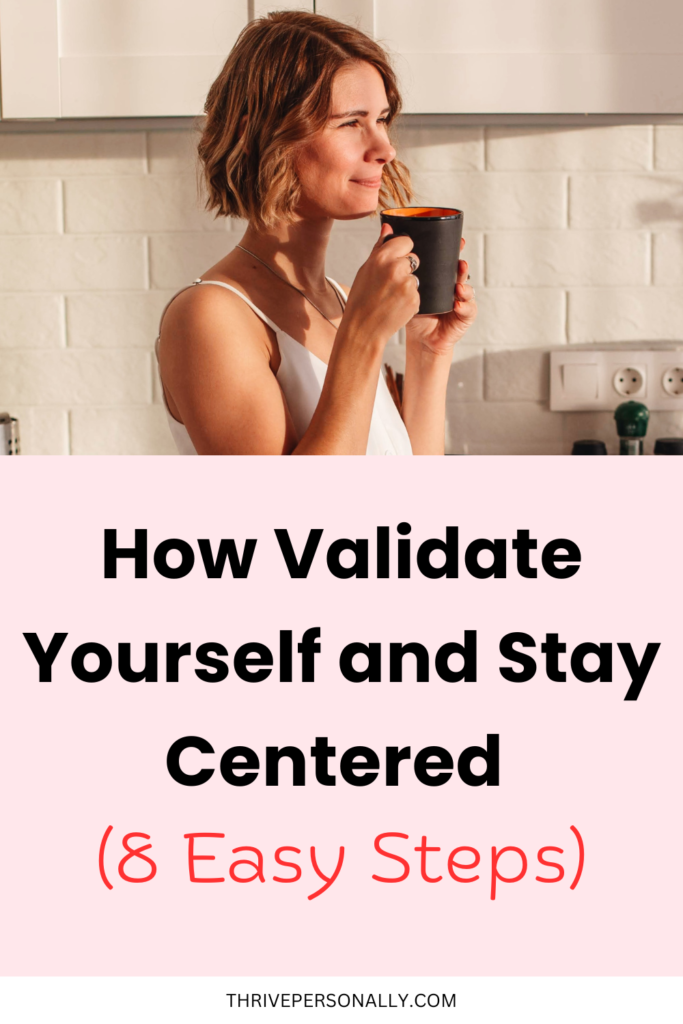I’ve come to understand that self-validation is the process of recognizing and accepting my thoughts, feelings, and experiences as real, legitimate, and valuable.
Instead of depending on approval from other people—like friends, family, or society—self-validation helps me build inner worth and live more authentically. And honestly, this inner form of validation has played a big role in improving mental health and overall well-being.
In a world where opinions and judgments can feel so loud, learning to self-validate has helped me become more resilient against negative feedback and social pressure. I’ve noticed that when I rely too much on external validation, my self-esteem can rise or fall depending on how people react to me.
That kind of dependency can easily create a cycle of self-doubt and anxiety, where my self-worth starts to depend on other people’s approval. But when I practice self-validation, I feel more stable within myself. I’m able to face challenges with more confidence and clearer thinking.
I’ve also seen how self-doubt can affect the mind deeply. It can make me feel inadequate and push me into constant comparison with others. And when I depend on external affirmation, I sometimes ignore my own needs, desires, and perspective—almost like I’m giving up my emotional independence.
But through self-validation, I’m learning to value my own opinions and emotions. It’s helping me regulate my feelings better and feel more satisfied with my life overall.
Here are the 8 Easy Steps to Validate Yourself and Stay Centered:
1. Recognizing Your Core Values
Understanding one’s core values is an essential aspect of self-validation. Core values are the fundamental beliefs that guide individual behavior, shape priorities, and influence decision-making.
When individuals recognize and articulate their core values, they gain insight into what truly matters to them, enabling a solid foundation upon which they can assess their actions and choices.
To begin identifying your core values, consider engaging in self-reflection exercises. Start by jotting down experiences that brought you joy or fulfillment.
Analyze these moments for common themes. For instance, if family gatherings consistently bring you happiness, it may highlight the value you place on relationships.
Conversely, if you feel a sense of accomplishment when tackling challenges, this might indicate a core value centered around growth or achievement.
Another effective strategy is to evaluate situations where you felt discomfort or distress. What values were being threatened in those moments? Perhaps a workplace scenario brought frustration due to perceived dishonesty.
This reaction can signal the importance of integrity in your life. By reflecting on both positive and negative experiences, individuals can cultivate a clearer understanding of their guiding principles.
Once you’ve identified your core values, it can be tremendously beneficial to create a personal mission statement. This statement acts as a compass, helping to steer decisions in line with the values that matter most to you.
For example, if one of your core values is sustainability, you might prioritize working for companies that share this commitment, or advocate for eco-friendly practices in your daily life.
Over time, consistent evaluation and application of your core values will strengthen your self-validation and contribute to a more grounded existence.
Related: 8 Ways to Feel Happier and Enjoy Life
2. Practicing Self-Compassion

Self-compassion is a vital practice that fosters emotional well-being and personal resilience. It is the ability to treat oneself with kindness, to recognize one’s shared humanity, and to be mindful of one’s thoughts and feelings without excessive criticism.
This approach not only helps in alleviating distress but also serves as a powerful antidote to negative self-talk and self-judgment.
One effective technique for cultivating self-compassion is through the use of positive affirmations. These simple, affirming statements encourage you to acknowledge your worth and remind you that imperfection is a part of being human.
For example, repeating phrases such as “I am enough” or “I deserve love and kindness” can create a nurturing inner dialogue that counters harsh self-criticism. Over time, these affirmations can embed a sense of self-acceptance and boost your overall self-esteem.
Incorporating mindfulness into daily routines also enhances self-compassion. Mindfulness encourages you to remain present, observe your thoughts without judgment, and accept your emotions as they arise.
This practice not only cultivates awareness but also creates a space where you can respond to challenges with gentleness rather than self-reproach.
When you feel overwhelmed by negative thoughts, taking a moment to breathe deeply and acknowledge your feelings can significantly shift your mindset.
Furthermore, developing a compassionate inner dialogue is essential to combating negative thoughts. Engaging in self-talk that focuses on understanding and accepting your flaws can transform your perception.
Instead of berating yourself for mistakes, aim to ask, “What can I learn from this?” This perspective allows you to view setbacks as opportunities for growth rather than personal failures.
Ultimately, practicing self-compassion nurtures a more positive relationship with yourself, promotes emotional resilience, and supports your journey to validation and grounding. Through a combination of positive affirmations and mindfulness, you can cultivate an inner voice that champions your worth and promotes emotional well-being.
Related: 8 Simple Morning Habits to Start Your Day Right
3. Setting Healthy Boundaries
Establishing healthy boundaries is a crucial aspect of maintaining emotional energy and overall well-being. Boundaries serve as a protective mechanism that fosters a sense of self-ownership, allowing individuals to assert their needs and preferences in various aspects of their lives.
There are several types of boundaries that one can set, including emotional, physical, and time-related limits. Each type plays a significant role in nurturing a positive self-image and validating personal experiences.
Emotional boundaries are essential for maintaining mental health. They involve recognizing, honoring, and protecting your feelings and thoughts.
For example, if someone consistently dismisses your emotions, establishing an emotional boundary can help protect your well-being. Communicating your feelings clearly to others can prevent emotional drain and promote healthier relationships.
Physical boundaries pertain to personal space and physical contact. Being assertive about physical limits can significantly improve one’s comfort level in both personal and professional settings. For instance, if you feel uncomfortable with unsolicited touch, it is vital to express that clearly to maintain your sense of security.
Time-related boundaries focus on how you allocate your time and energy. In a world where demands constantly vie for attention, protecting your time can enhance productivity and reduce stress. Setting aside dedicated time for yourself or asserting your need for focused work hours reinforces your priorities and promotes self-respect.
To effectively communicate these boundaries, it is important to be clear and assertive. Utilize “I” statements to express your feelings, such as “I feel overwhelmed when…” This approach can help others understand your perspective without feeling attacked. Remember, setting boundaries not only safeguards your emotional energy but ultimately contributes to healthier relationships and a deeper sense of self-validation.
Related: 8 Easy Practices I Use to Boost My Confidence Daily
4. Embracing Imperfection
In the journey of self-validation, embracing imperfection stands as a crucial milestone. Many individuals fall into the common trap of perfectionism, believing that every endeavor must be executed flawlessly.
This mindset can often lead to unnecessary stress and a harsh self-critique. However, accepting imperfections can liberate one from these constraints, allowing for genuine growth and progress.
The first strategy to cultivate a sense of acceptance is to reframe mistakes as learning opportunities. Instead of viewing errors as failures, consider them valuable experiences that contribute to personal development.
For instance, keeping a journal dedicated to reflecting on daily challenges and the lessons learned can facilitate this shift in perspective. Over time, one can recognize that mistakes offer insights that pave the way for future success.
Another effective strategy is to engage in self-compassion practices. This involves treating oneself with kindness during moments of struggle or failure. Positive affirmations can reinforce this concept, reminding oneself that it is okay to be human and imperfect. Simple phrases like “I am enough,” or “It’s okay to make mistakes” can serve as effective reminders that promote a healthier self-image.
Additionally, surrounding oneself with supportive individuals who also embrace imperfection can create a nurturing environment. Sharing vulnerabilities in a safe context enables authentic connections, fostering a sense of community. These relationships can help dismantle the unrealistic standards often set by oneself or societal expectations.
Ultimately, embracing imperfection is not about settling for mediocrity; rather, it reflects a shift towards valuing progress over perfection. This conscious effort to appreciate every step in the journey cultivates a sense of grounding, allowing individuals to validate their worth beyond achievements. The recognition that everyone is flawed can encourage a more profound acceptance of oneself and a more enriching life experience.
5. Engaging in Reflective Practices

Reflective practices play a pivotal role in cultivating self-awareness and grounding oneself in their values and beliefs. Among the various forms of reflection, journaling and mindfulness meditation are two particularly effective methods.
Journaling provides a safe space to articulate thoughts and feelings, enabling individuals to explore their emotions in depth. By writing down daily experiences, challenges, and successes, one can gain insights into patterns of behavior and thinking that may need addressing.
This practice not only fosters a deeper understanding of oneself but also serves to reaffirm self-worth when recognizing progress and achievements.
Mindfulness meditation, on the other hand, encourages individuals to focus on the present moment, calmly observing their thoughts rather than becoming entangled in them.
This non-judgmental awareness can lead to greater clarity regarding personal values and beliefs. Regular practice of mindfulness has been shown to reduce stress and anxiety, enhance emotional regulation, and improve overall well-being.
By integrating mindfulness exercises like focused breathing or body scans into one’s routine, individuals can cultivate a more profound connection to themselves.
Establishing a regular reflection routine can significantly enhance the benefits derived from these practices. Consider allocating a specific time each day or week for reflection, which can enhance consistency and commitment.
For journaling, select a comfortable writing space and use prompts to guide your entries, focusing on what you are grateful for or lessons learned from challenges. In mindfulness meditation, starting with short sessions, such as 5 to 10 minutes, gradually increasing duration as comfort with the practice develops can be beneficial.
Select practices that resonate with your personal style and preferences, as adherence to a routine is essential for long-term benefits. Embracing these reflective practices can facilitate a deeper understanding of thoughts and feelings, ultimately leading to a more grounded and validated sense of self.
6. Building a Supportive Community
Establishing a nurturing environment is imperative for personal validation and emotional resilience. Surrounding oneself with positive and supportive individuals can significantly impact one’s self-esteem and outlook on life.
A supportive community serves as an integral buffer against external pressures, allowing individuals to feel valued and understood. Such an environment fosters connections where experiences and feelings are acknowledged rather than dismissed, enhancing one’s capacity to navigate through life’s challenges with confidence.
Acknowledging the significance of community, it is important to actively cultivate relationships that reinforce one’s sense of self-worth. This can be achieved by reaching out to friends, family members, or groups that share common interests and values.
Engaging in activities that promote interpersonal connections, such as community events, workshops, or support groups, can provide a platform for building friendships rooted in mutual respect and understanding. As these bonds strengthen, individuals often find that their need for external validation diminishes, replaced by intrinsic confidence nurtured by affirmation from trusted peers.
However, it is equally important to recognize and distance oneself from toxic influences. Not all relationships contribute positively to one’s growth.
Individuals should assess their interactions and identify those that may breed negativity or self-doubt. Surrounding oneself with negative or critical individuals can impede self-validation and lead to feelings of inadequacy. A conscious effort to limit engagement with such influences fosters a healthier emotional landscape, reinforcing the importance of positive relationships.
7. Celebrating Small Wins
Recognizing and celebrating small victories is a crucial practice for personal development and self-validation. It often serves as a reminder that progress is not always defined by grand accomplishments but can also be found in the small milestones achieved along the way.
Small wins, such as completing a task on time, maintaining a healthy routine for a week, or even overcoming a minor challenge, merit acknowledgment. When these achievements are celebrated, they contribute positively to our self-esteem and motivation.
Therefore, cultivating a habit focused on recognizing these small victories can have a significant impact on one’s overall emotional wellbeing.
Tracking progress is one effective strategy to facilitate this mindset. Creating a journal or list that records daily, weekly, or monthly achievements can help individuals visualize their progress.
By consistently noting even the tiniest of accomplishments, one begins to appreciate the journey and not just the end goal. This practice not only aids in reinforcing a sense of purpose but also serves as a motivational tool during tougher days when self-doubt may arise.
Additionally, incorporating gratitude into the celebration of small wins fosters a more resilient mindset. Taking the time to reflect on the efforts that went into achieving these milestones can boost feelings of self-worth.
Engaging in activities such as sharing accomplishments with friends or family can enhance the sense of validation, as discussing achievements contributes to a supportive social environment. By surrounding oneself with encouragement, the habit of celebrating small wins becomes more robust and ultimately leads to a more grounded self-perception.
Recognizing achievement, no matter how minor it may seem, establishes a foundation for ongoing personal growth and fulfillment.
8. Staying Mindful and Present
The practice of mindfulness plays a crucial role in fostering a sense of grounding and self-validation. Mindfulness is essentially the art of paying focused attention to the present moment, which allows individuals to connect more deeply with their emotions and experiences.
By incorporating mindfulness into daily life, one can cultivate an awareness that enables the recognition and acceptance of feelings without the need for judgment.
To effectively embrace mindfulness, individuals may consider starting with simple techniques such as mindful breathing exercises.
This involves concentrating on one’s breath, observing each inhalation and exhalation. By focusing on these physical sensations, the mind can be brought back from distractions, thereby promoting a tranquil state. Additionally, engaging in mindfulness meditation can provide a structured approach to enhancing awareness.
Many individuals find that even a few minutes of daily practice can foster a greater sense of calm and clarity.
Another valuable technique is to incorporate mindfulness into routine activities. Whether it’s eating, walking, or washing dishes, bringing conscious attention to these tasks allows individuals to experience the moment fully.
By thoughtfully engaging in these actions, one can enhance the sensory experience, thereby enriching the overall quality of life. This practice not only aids in emotional regulation but also fosters an environment conducive to self-validation.
Research has demonstrated that consistent mindfulness practice can lead to improved emotional well-being, enabling individuals to better manage stress and anxiety.
By learning to observe thoughts and feelings as they arise—without attachment or aversion—one may cultivate a more compassionate relationship with oneself. As a result, mindfulness serves as a powerful tool for validating personal experiences, ultimately contributing to a grounded and emotionally stable life.
Save the pin for later



